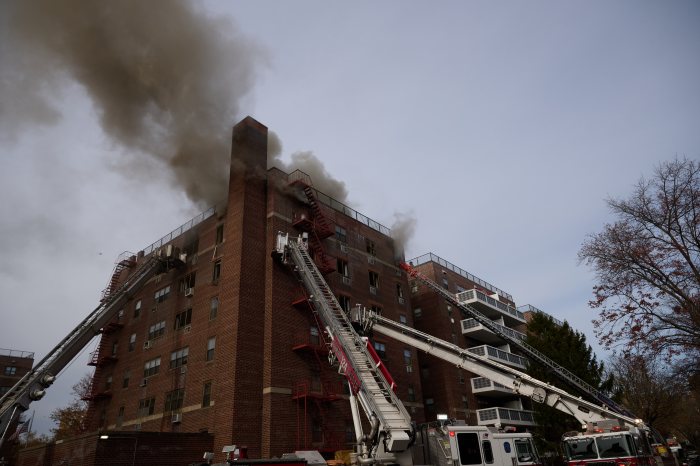By JERRY TALLMER
Oh what a beautiful child. Too beautiful.
A beautiful child atop a beautiful horse, except that the head of the child was too large for her body, and the face of the child was that of a beautiful grown young woman twice or more that child’s actual age, which at the time of the making of “National Velvet” was somewhere between 11 and 12.
But the voice of the child would remain just that, a childlike voice, flat and nasal to indicate emotion, whatever the picture and the role, thereby destroying some of the best stuff we’ve ever had, from “Butterfield 8” to “Under Milk Wood” to “Suddenly, Last Summer” to “A Place in the Sun” to… .
A child who got married seven or eight times, depending on how you counted.
“You find her boring? You’d turn her down?” said sardonic, weatherworn “Cleopatra” producer Walter Wanger, just back from shooting in Egypt, I think it was, hiking his 69-year-old legs up onto a couch in the Waldorf. “You’d be a damned fool.”
That was 1962. In the summer of 1964 a Broadway-bound production of Shakespeare’s “Hamlet” was gathering itself together up in Toronto. On hand were its director, Sir John Gielgud, its star, Richard Burton, its star’s off-and-on wife, Elizabeth Taylor, and, among many others, a young aspiring assistant press rep named David Rothenberg, who then, as now, lived in Greenwich Village and had a special interest in what were coming to be called gay rights.
This was some 15 or 16 years before the word “AIDS” had been invented. Or needed.
“On the first day in Toronto,” Dave Rothenberg says all these years later, “everybody assembled outdoors, Gielgud, Burton, the producers, technicians, actors, everybody.
“Elizabeth Taylor came over to me, took my arm, and said: ‘They don’t need us, honey. Let’s go over there and get something to eat and have a talk.’
“What I most remember,” says Rothenberg, “is that I was a kid dazzled by her beauty and graciousness. She focused on me, wanted to know who I was, where I was going.”
Where he was going was into producing a tiny Actors’ Playhouse and eventual worldwide hit, “Fortune and Men’s Eyes,” set in a detention center for Canadian youth; into the founding and operation to this day of the Fortune Society, which helps ex-convicts back into society; into long-running radio at WBAI; into politics, as the first openly homosexual candidate for public office in New York State or City.
“I was her date opening night in Toronto,” says Rothenberg, “and we were always together for those six months, Toronto and New York. I was the one she didn’t marry,” he throws in dryly. “With all those kicking, screaming crowds, she was always in complete control of every situation — the opposite of Marilyn.”
Elizabeth Taylor, of course, also didn’t marry Roddy McDowall, Montgomery Clift, Rock Hudson or Michael Jackson, or hundreds of thousands of other outsiders in every country who loved her as they had once loved Judy, and still do.
“At a time when people were dying right and left, and NO celebrity would touch AIDS publicly, though some might have privately, Elizabeth Taylor came through,” says a lifelong Greenwich Villager named Abby Tallmer. “Elizabeth Taylor and Princess Diana — the only two.”
Abby was one of five people working in the office of Dr. Mathilde Krim’s amFAR — the Foundation for AIDS Research — up near Grand Central Station, when a check arrived there for “a really extremely huge amount of money” to help fight AIDS. It was shortly followed by two equally huge FedEx boxes full of glossy, autographed photos of you know who.
“It may have seemed kind of crude, but also kind of sweet,” says my daughter — “Elizabeth Taylor being a kind of icon for gay men who might appreciate such a photo.”
Some days later, the telephone rang. It was Elizabeth Taylor wanting to know if everything had arrived O.K., and ‘What’s your name, dear? Tell me about yourself… .’
“Elizabeth Taylor was fun,” says a playwright named Edward Albee who lives in a loft in Tribeca. He is a man who wastes no words, on or off the page, and now, pressed for further comment, the writer of “Who’s Afraid of Virginia Woolf?” — play and movie — says: “Well, her only good performance in films was [as Martha to Richard Burton’s George] in ‘Virginia Woolf.’ Of course, she had a good director in Mike Nichols, and was 25 years too young for the role. But I liked her.”
Yes, Edward. And what about her whole life’s loyalty toward and courage on behalf of those she loved, as well as homosexuals everywhere?
“Oh, yes,” said Albee crisply, “her mind had the right priorities.”
“What most enraged Elizabeth Taylor,” says gay-rights activist Abby T., “was Ronald Reagan’s perpetual refusal even to utter the words ‘gay’ or ‘AIDS.’”
“She’s funny, she’s fun, she’s sexy, she’s gorgeous, she swears like a trooper, she has guts, she doesn’t take s— from anybody, she speaks her mind,” said Walter Wanger back there in the Waldorf nearly 50 years ago. “And you find her boring? You’d turn her down? You’re a damned fool, you know that?”
Yes, Mr. Wanger, I guess I do.


































